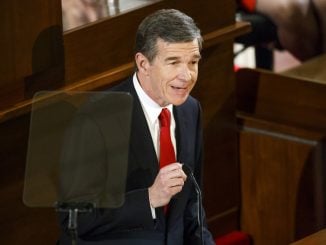
RALEIGH — Gov. Roy Cooper (D) announced the first of his three-phase plan to re-open North Carolina’s economy will begin Friday at 5 p.m. But, his chief political rival says Cooper is letting fear drive policy decisions related to the coronavirus. The first phase leaves Cooper’s stay-at-home order in place but allows for more commercial activity. The executive order for phase one is in effect from May 8 until May 22.

“This is a careful and deliberate first step, guided by the data, and North Carolinians still must use caution while this virus is circulating,” said Cooper.
On Wednesday morning, Lt. Governor Dan Forest (R) responded to Cooper’s continuation of the statewide stay-at-home orders and restrictions on religious freedoms.
“The Governor’s Phase 1 rollout makes it clear that he feels that only he can protect us from this virus. He does not believe that North Carolinians have enough self-control, restraint, or common sense to act responsibly in a world with COVID-19,” said Forest. “While his announcement finally recognized that all jobs are essential, his new order changes very little across our state. For a state that prides itself on being ‘First in Freedom,’ the Governor has repeatedly denied North Carolinians the freedom to make decisions for themselves, their families, and their livelihoods.”
Forest, who will challenge Cooper in November for the governor’s office, said he understood initial caution due to the uncertainty surrounding the virus and the threat it posed. “I understand completely the cautious approach that he and governors around the country took two months ago,” said Forest. “However, with all the data publicly available from other states, there is no need to continue using fear to drive policy decisions.”
Forest also focused on the detrimental effects the statewide lockdown is having on the N.C. economy. “When we have over one million citizens on unemployment, countless medical surgeries and screenings delayed, and businesses on the brink of permanent closure, it is time to do everything possible to give people a chance to live and utilize their God-given freedom once again.”
Many political leaders, including Forest, have questioned Cooper’s orders which allow some gatherings and prohibit others. In the newest order, Cooper allows additional retail activity but says that church services and other “First Amendment activities” must be held outside unless it would be “impossible” to hold a gathering outside.
“If we are able to social distance outside at parks, why are we not able to do the same in outdoor seating at restaurants? If we are able to congregate at 50% capacity in a big box store, why can we not do the same with social distancing at our houses of worship?,” said Forest. “It is way past due for the Governor to shift strategies and put measures in place that restore our freedoms in a responsible manner.”
On Tuesday, Senate Leader Phil Berger (R-Eden) questioned the basis of Cooper’s continuation of most of the previous provisions in the executive order.
“We were told ‘flattening the curve’ to prevent overloading hospitals justified a lockdown. Hospitals are not overloaded, and in fact they’re laying people off. So what is the theory to support this plan – eliminate infections or just delay them? Gov. Cooper apparently disagrees with Colorado’s Democratic governor and others who say that a continuing shutdown will not cause a peak in COVID-19 cases to be any less severe, it will only push it down the line,” said Berger.
Berger appeared to push for a regional approach, saying that the state doesn’t need a blanket statewide order when over half of the state’s counties comprise less than 10% of confirmed cases of COVID-19.



